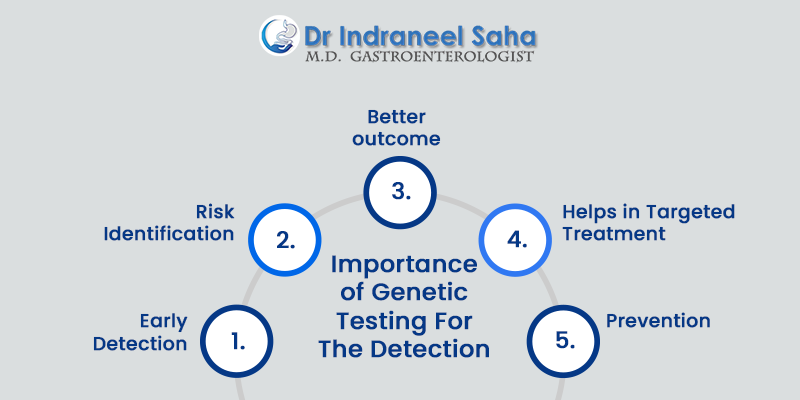- 28th Aug, 2024
- Pancreas Doctor
Genetic Predisposition In Pancreatic Cancer
Pancreatic cancer is the most common and devastating type of cancer, owing to its late diagnosis and poor prognosis. This lethal form of cancer tends to progress very rapidly, leading to fatal outcomes in most patients. While lifestyle factors are considered to be the primary cause of pancreatic cancer, genetic risk factors play a significant role in the development of pancreatic cancer.
Here, we will discuss the genetic predisposition to pancreatic cancer for early diagnosis and effective treatment.
Understanding Pancreatic Cancer
The pancreas is a gland which is located below the abdomen. It is responsible for making enzymes that aid in digestion and maintaining blood sugar levels. Pancreatic cancer begins when abnormal and malignant cells in the pancreas grow out of control and accumulate in clusters to form a tumour.
If the cancerous cells are not removed in the early stage, they spread to other tissues and organs within the abdomen and liver, resulting in pancreatic metastatic pancreatic cancer. In stage IV, these cells even multiply in the lungs, brain and bone.
Is Pancreatic Cancer Hereditary?
About 10% of pancreatic cancer cases are hereditary. That means one in every ten patients is likely to have an inherited mutation that increases the risk of developing the disease.
As said before, genetic mutation is a major risk indicator of pancreatic cancer. However, it is to be noted that genetic mutation can even happen during a person’s lifetime i,e they are not passed from one parent to the child. This is known as germline mutation.
For early detection of this disease, the best pancreas doctor in Kolkata advises patients to know the family medical history of pancreatic or any other type of cancer. They are encouraged to go for genetic testing for both inherited or germline mutations.
Genetic Mutations That Are Responsible For Pancreatic Cancer
The most common type of genetic mutation is BRCA (BRCA1 and BRCA2). However, there are other genetic mutations such as CDKN2A, STK11, TP53, and PRSS1.
Importance Of Genetic Testing For The Detection Of Pancreatic Cancer
If you have a family history of pancreatic cancer or are known to have a genetic mutation, genetic testing is extremely crucial.
Genetic testing is a medical examination of the DNA to look for changes in the genes, chromosomes, genomes and proteins. Here is how genetic testing is required for pancreatic cancer.
- Early detection: Genetic testing helps identify individuals who are at a higher risk of developing pancreatic cancer. This helps in early diagnosis and treatment.
- Risk identification: Genetic mutations like BRCA1 and BRCA2 are responsible for causing pancreatic cancer. So, with the help of genetic testing, doctors are able to look for these mutations for proactive mutations.
- Better outcome: Early detection of the disease facilitates cancer treatment outcomes because the disease becomes more responsive. Also, early diagnosis reduces the progression of the, thereby decreasing the long-term complications.
- Helps in targeted treatment: With genetic testing, surgeons can find whether patients are likely to respond to certain targeted therapies. They will test the specific drug that will be effective for the treatment of the tumour.
- Prevention: Genetic testing of family members provides crucial information about the risk of pancreatic cancer in the family. This in turn will help you take better precautions to prevent this type of cancer.

Conclusion
Pancreatic cancer is asymptomatic in the initial stage irrespective of the genetic mutation. So, by the time patients start experiencing the symptoms, the disease is already in the advanced stage.
So, if you think that you might have pancreatic cancer, make sure to consult the best pancreas doctor in Kolkata for an accurate diagnosis.